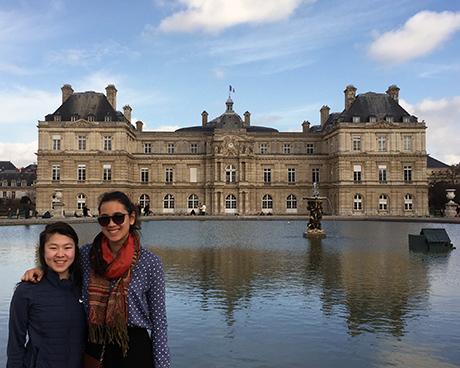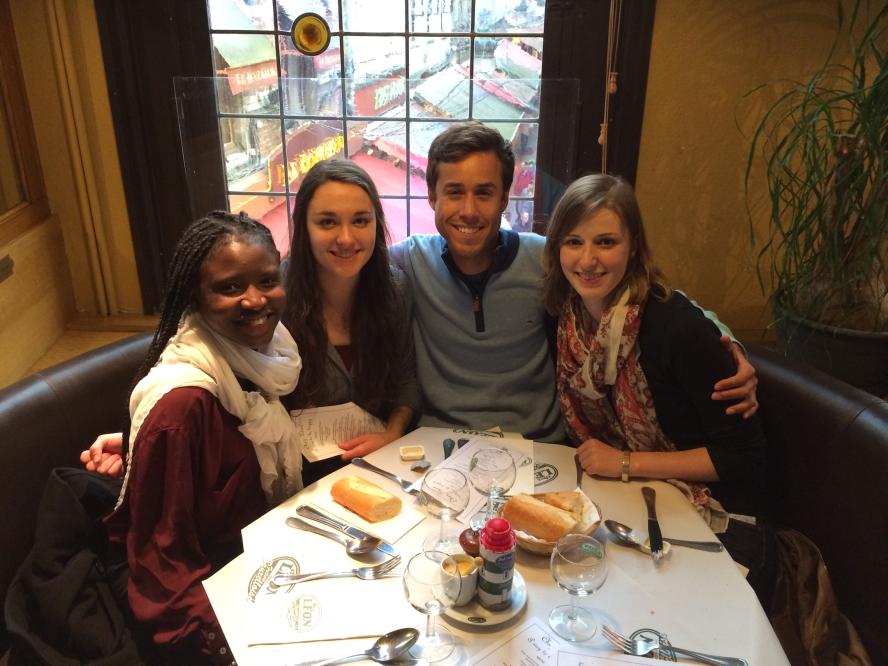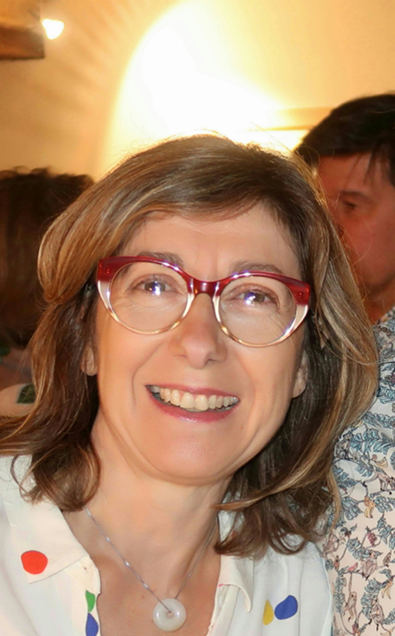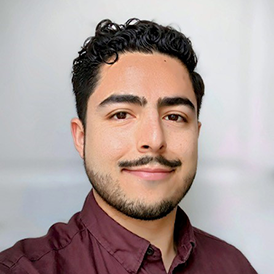
Paris, France
Paris, often hailed as the “City of Lights,” is a vibrant metropolis with a rich cultural heritage, captivating architecture, and a thriving artistic scene. Studying in Paris offers a unique opportunity to immerse yourself in this dynamic environment, a city that has long been an intellectual and educational hub, while also earning academic credit towards your degree. The academic culture in Paris is rigorous and challenging, with a strong emphasis on independent learning and research. Depending on the institution, students can study a single subject in depth or take a wider range of courses. Both approaches allow students to take advantage of the city’s many libraries, museums and galleries, and an array of cultural institutions.
Tufts in Paris partners with five highly regarded institutions to offer a primary program track and three specialized tracks, giving students from almost every academic discipline the opportunity to tailor their experience to their academic interests and goals. Regardless of the track chosen, students will benefit from the dedicated support of the Tufts-in-Paris on-site staff and will have the opportunity to participate in an array of program excursions and outings. These include cultural events, focus groups, and activities (such as cooking classes, perfume workshops, etc.), which allow students to explore the many diverse facets of contemporary Paris. Learn more about each program track and our partner institutions below:
The following chart offers a snapshot of our partner institutions to get you started, but it is not a comprehensive guide, nor does it capture the nuances of each institution. For example, we list the minimum GPA requirements under Eligibility although certain departments have higher GPA requirements and there may be additional eligibility criteria. Review the Academic section for more details. Note that French institutions may limit enrollments, and priority may be given to students enrolling for the full year or taking a course toward their major.
| CentraleSupélec | Paris College of Art | SciencesPo Paris | Sorbonne Nouvelle (Paris III)- Primary Track | Université Paris Cité (Paris VII)- Primary Track | |
|---|---|---|---|---|---|
| Terms | Spring | Fall Spring Full Year | Full Year | Fall Spring Full Year | Fall Spring Full Year |
| Eligibility | Minimum 3.5 GPA and specialized coursework; FR 1 or equivalent | Minimum 3.0 GPA and portfolio submission; FR 1 or equivalent | Minimum 3.5 GPA and passing qualifying exam; FR 22 or equivalent | Minimum 3.0 GPA; FR 22 or equivalent | Minimum 3.0 GPA; FR 22 or equivalent |
| University Size | 4,200 | 300 | 14,000 | 19,000 | 64,000 |
| Location | Gif-sur-Yvette/ Saclay (suburb approx. 1 hour south of Paris by train) | 17th arrondissement | 6th arrondissement | 12th arrondissement | 13th arrondissement |
| Campus Type | Urban, but lodging is next to campus | Urban, students must commute to campus | Urban, students must commute to campus | Urban, students must commute to campus | Urban, students must commute to campus |
| Course Registration | All courses taken at CentraleSupélec | All courses taken at PCA | All courses taken at SciencesPo Paris | Combination of in-house courses and university courses Students can enroll in up to two departments. | Combination of in-house courses and university courses Students can enroll in up to two departments. |
| Course Selection | Engineering, Computer Science, Mathematics | Fine Art, Graphic Design, Fashion Design, Interior Design | Political Science, International Relations | Literature, Comparative Literature, Linguistics, Theater, Cinema and Media studies, Languages | Literature, Humanities, Social Sciences, Economics, Psychology, Linguistics, History, Geography, Philosophy, Biology, Physics, Chemistry, Computer Science |
| Course Type | Lectures, modules, projects | Studio workshops, lectures | Seminars, lectures | Seminars, lectures | Seminars, lectures, labs in science courses |
| Housing | On-campus student residence | Student residence | Homestay or student residence | Homestay or student residence | Homestay or student residence |
| Study Abroad Support | Very active international students organization | Dedicated International Student Office with significant programming for study abroad students | Dedicated International Student Office with significant programming for study abroad students | Dedicated International Student Office mostly for academics | Dedicated International Student Office mostly for academics |
| University Culture | Both traditional and independent projects | Non-traditional Emphasis on creative exploration and experimentation | Traditional | Traditional | Traditional |
Academics
Students enroll in a minimum of four courses, or the equivalent full-time course load at the host institution, each semester.
Certain courses may have additional prerequisites. All advising and final course selection will take place in Paris and must be approved by the program director. Refer to the websites provided below to view available course offerings for the current year and consult the list of courses previously taken through our partner institutions.
Be sure to review our academic policies for education abroad and plan accordingly with your academic advisors.
Primary Track
The primary track is conducted entirely in French. Students are required to enroll in at least two in-house courses, in addition to two courses at Sorbonne Nouvelle (Paris III) or Université Paris Cité (Paris VII). We strongly encourage students who have completed 100-level French courses at Tufts to take no more than two in-house courses and to enroll in at least two French university courses.
Full-year students on the primary track can engage in part-time internships, with placements available in various settings such as small French companies, art galleries, and NGOs. Full-year students may also take the TCF (test de connaissance du français), which is recognized worldwide as validation of their level of French; test results are valid for two years.
Volunteer activities are available for both semester and full-year students.
Prerequisites
This program is open to Tufts undergraduates who meet the general eligibility requirements and who have successfully completed French 21 and 22 (Composition and Conversation), or the equivalent of six semesters of college-level French. It is highly recommended to have taken at least one third-year course, such as French 31 or 32 (Masterpieces of French Literature) or French 121 or 122, and to take a French language or literature course in the semester prior to the intended term in Paris.
Applicants must have a minimum 3.0 GPA in all French courses. Additionally, each partner institution and some departments have additional admission requirements and stipulations, as outlined below.
Applicants from all majors are encouraged to apply but should have a demonstrated interest in French and French-speaking cultures. Majors from various departments—including Art History, Economics, English, French, history, International Relations, Political Science, Psychology, and Sociology—have participated in the program.
In-house Courses
Tufts in Paris offers three in-house courses per semester. The in-house art history course meets primarily in museums twice a week, whereas all other in-house courses meet twice a week.
-
FR340.a. Feminism and Gender Studies in France: History, Theories and Performances
Fall Semester
The course offers an introduction to gender studies in the French context. It traces the history of feminist struggles and theories (first, second, third, fourth “waves”) and exposes the various points of view mobilized: universalism, materialism, differentialism, queer, decolonial and intersectional feminisms. Issues of current gender and society such as the evolution of the family or the wearing of religious symbols conspicuous at school, will be examined. Finally, we will analyze the political dimension by studying literary productions and artistic performances which are capable of re-founding language and questioning representations as claimed by Monique Wittig.FR340.b. National Identity and Contemporary Challenges in French Post-Colonial Context
Fall Semester
This class examines French and Francophone cultural productions since the end of the Second World War, a traumatic event that transformed and deeply marked France’s society. We will focus on the evolutions of French national identity and diverse representations of it, in a context of decolonization, European dynamics, and globalization. The concept of national identity is challenged by multicultural and immigrant populations that shift our understanding of “French” towards a transnational perspective. The critical urgency of this issue of definition is underlined by increasing political tensions in France, that are also accentuated by the growing demands for new public commemorations that seek to acknowledge silenced, wounded memories and that, in doing so, may further divide society. We will examine how dissent about French identity revives democracy while paradoxically undoing national borders.FAH 340: Masterpieces in Parisian Museums (18 C to Present)
Fall and Spring Semesters
Chronological survey of French art and architecture from 18 C to the present, with an emphasis on masterpieces in Parisian Museums. Classes and lectures take place mainly in the museums of Paris, Louvre, Orsay, Picasso, Marmottan, Modern Art Museum, Orangerie, Centre Pompidou, Bourse du Commerce.FR340.c Francophone Colonial and Post-Colonial Migrations and Identities
Spring Semester
Through the history of migrations in modern and contemporary times, this course focuses on narratives (textual, filmic, artistic) of colonial and postcolonial identities, from the beginning of the French Empire up to the postcolonial era of today. Particular attention is given to relations between France and North Africa. We will also examine plural histories linked to various migrations: voluntary, forced, clandestine, stimulated by colonialism, decolonization, civil wars, political conflicts and economic difficulties producing exiles, migrants and refugees in record numbers today. The course is organized around three themes: Colonial migrations and the politicization of identity; postcolonial identities as carried by the French generations descended from immigration and current clandestine migrations and the question of “refuge”.FR340.e Paris in Literature, 19th to 21st Century
Spring Semester
The myth of Paris was born in the first half of the 19th century with the legibility of the city. Added to urban cartography is the representation of the city by writers. The Parisian “painting” or “landscape”, from Mercier to Baudelaire via Balzac and pushing on to Jacques Réda, writes the city as much as it reads it. It is this modern Paris as a city-text that the course wants to explore through the literary and artistic representations of the 19th, 20th and 21st centuries which both shape and question its myth. With the studies of 4 major literary texts, Parisian society and literary life are staged, told and questioned. A microcosm, the capital becomes the occasion for a broader reflection on society and the meaning of existence. But it will be the particularities of the French capital as well as its challenges in the face of history and urban and social transformations that will be examined and highlighted.
Partner University Courses
French university courses typically meet once or twice per week, depending on the specific course and institution.
Université de la Sorbonne Nouvelle (Paris III)
Sorbonne Nouvelle, also referred to as Paris III, is a prestigious public university located in the vibrant Rive Droite of Paris’s 12th arrondissement. Founded in 1971, it is one of the thirteen autonomous universities that emerged following the division of the historic University of Paris (1150-1970). Sorbonne Nouvelle is highly regarded for its multidisciplinary approach to the arts and humanities, offering a wide range of academic disciplines. The university attracts a diverse student body with international students comprising 25% of its student population.
Terms
Fall, Spring, Full Year
Courses
Sorbonne Nouvelle offers a wide range of academic disciplines such as Cinema, Comparative Literature, European Studies, French Language and Literature, and Theater Studies. Students may take courses from up to two of the following departments:
- CAV: Cinéma et audiovisuel
- ICM: Institut des communications et médias
- IEE: Institut d'études européennes
- IET: Institut d’études théâtrales
- ILPGA: Institut de linguistique et phonétique générales et comparées
- LGC: Littérature générale et comparée
- LLFL: Littérature et linguistique françaises et latines
- MC: Département de médiation Culturelle
Université de Paris Cité (Paris VII)
Université Paris Cité, commonly referred to as Paris VII, is a prominent public research university situated on the Rive Gauche in the 13th arrondissement of Paris. Formed through the merger of Paris Descartes (Paris V) and Paris Diderot (Paris VII) universities in 2019, Université Paris Cité carries the legacy of the renowned University of Paris (1150-1970). It is a multidisciplinary institution offering a wide range of disciplines, including the Humanities and Social Sciences, Natural Sciences, Medicine and Health Sciences, and Law.
Terms
Fall, Spring, Full Year
Courses
Paris Cité offers a wide range of courses across various disciplines. The most popular among Tufts students have included: Chemistry, Cinema, Computer Science, Economics and Society, Geography, History, Life Sciences, Literature, Linguistics, Mathematics, Physics, Psychology, and Sociology. Students may take courses from up to two of the following departments:
- Chimie
- GHES: Géographie, histoire, économie et sociétés
- IHSS: Institut Humanités, Sciences et Sociétés: Etudes psychanalytiques; Histoire; Philosophie des sciences; Sciences sociales
- Informatique
- LAC: Lettres, arts et cinéma: Parcours études cinématographiques; Parcours lettres; Parcours lettres et sciences humaines
- LSH: Lettres et Sciences Humaines: Arts du spectacle; Géographie; Histoire; Histoire-Géographie; Lettres et arts; Lettres sciences humaines; Lettres-Histoire; Lettres-Sciences du langage; Sciences économiques et sociales; Sociologie
- Mathématiques
- Physique
- SDV: Sciences du vivant
- UFRL: Linguistique
Internships
Full-year students enrolled in the Primary Track may apply for a non-credit internship during the fall semester for participation in the spring semester. Internships typically begin in early February and consist of two full days per week for eight weeks. Interested students must attend an informational meeting in October and submit a résumé in French to the Internship Coordinator by November 1.
Previous students have secured internships primarily within French or international non-profit organizations, as well as art galleries. Proficiency in French may be required for certain internship positions. Interviews are conducted in French, and the final decision is made by the organization offering the internship. All interns are expected to complete 110-120 hours of service and are required to submit a final internship report to the program director. Additionally, an exit interview conducted in French is required to receive a transcript notation.



Specialized Program Tracks
Students admitted to CentraleSupélec, Paris College of Art, or SciencesPo must take all courses through the host institution and are ineligible for Tufts-in-Paris in-house courses.
Prerequisites
In addition to the prerequisites outlined below, Tufts will examine enrollment capacity and may be unable to nominate all candidates to their partner of choice.
| CentraleSupélec |
|
|---|---|
| Paris College of Art |
|
| SciencesPo Paris |
|
CentraleSupélec
CentraleSupélec (CS) is a leading institution in France for science and engineering, renowned for its programs in computer science, engineering, and mathematics. CentraleSupélec was formed in 2015 through the merger of École Centrale Paris and Supélec, two esteemed engineering schools established in 1829 and 1894, respectively. As a constituent member of the prestigious Paris-Saclay University, CS benefits from a vibrant intellectual community and collaborations with other leading institutions. Situated in the suburb of Gif-sur-Yvette, approximately an hour south of Paris by train, CS provides students with a conducive environment for learning and research while remaining well-connected to the academic and cultural offerings of Paris.
Terms
Spring
Prerequisites
The CentraleSupélec track is open to a small cohort of Computer Science, Data Science, and Electrical Engineering majors who meet the general eligibility requirements and have a minimum 3.5 GPA. Applicants must have completed Math 51 and French 1. Additional math courses are strongly recommended.
Courses
Courses are taught in modules and complemented by a team-based technical project. All courses are taught in English, although there is a mandatory 2-week intensive French language course at the beginning of the semester. Tufts students may only enroll in courses at the Paris-Saclay campus. Students may enroll in Computer Science of Electrical Engineering courses for the spring semester.
Paris College of Art
The Paris College of Art (PCA) is private college of art and design with U.S. degree-granting authority and accreditation from the National Association of Schools of Art and Design (NASAD). PCA offers high-level art instruction that combines a U.S. pedagogical approach with inspiration from France and the surrounding European environment. PCA's new facilities are located in a high-end neighborhood full of lush parks on the Rive Droite, in the 17th arrondissement, and within walking distance of Porte Maillot and the Champs Elysées.
Terms
Fall, Spring, Full Year
Prerequisites
The Paris College of Art track is open to a select cohort of SMFA students who meet the general eligibility requirements and have completed French 1 at the college-level, or the equivalent. Students are strongly encouraged to take additional French language while at PCA.
Following notification of nomination by Tufts Programs Abroad, applicants will be expected to submit a portfolio of their work and have a formal interview with the PCA Admissions team.
Courses
Students enroll in studio courses in the following subject areas: Communication Design, Fashion Design, Fine Arts, Interior Design, Photography, and Liberal Studies. Art History courses are not available to our students. All courses are taught in English, with the exception of any French language courses. Course selection is based on an interdisciplinary approach but must be discussed during the application interview.
SciencesPo Paris
SciencesPo Paris, or the Paris Institute of Political Studies, is a prestigious public research university renowned for its academic offerings and research in Political Science and International Relations. Founded in 1872, SciencesPo has seven campuses across France and boasts a strong international focus, with approximately one-third of the student population consisting of international students. In fact, nearly half of the 2,000 undergraduates at SciencesPo Paris are international students participating in an exchange program. Situated in the vibrant Rive Gauche area of the city’s 6th arrondissement, SciencesPo Paris enjoys a central location known for its historic districts, intellectual heritage, and café culture.
Students must participate in a mandatory welcome program, which includes methodology sessions, and fun activities with the international students' cohort.
Tufts in Paris can nominate a small cohort of qualified students to study at SciencesPo Paris; successful students will participate in the full-year certificate program in Social Sciences and Humanities at Sciences Po Paris and all courses must be taken in French.
Terms
Full Year
Prerequisites
The SciencesPo Paris track is open to students who meet the general eligibility requirements and have completed French 22 at the college-level, or the equivalent. A minimum 3.5 GPA is recommended for application.
Following application to the SciencesPo Paris track, applicants must take a qualifying exam to determine their eligibility for the program. The exam is administered on the Tufts Medford campus in the spring semester of the academic year prior to the intended year abroad (i.e., spring 2026 for participation in the 2026-2027 academic year). Students who do not pass the qualifying exam do remain eligible for the primary track of the Tufts-in-Paris program.
Tufts Global Education will review all applications, although SciencesPo makes the final admission decision. Read more about the application process on their Exchange Programme page.
SciencesPo students may take the TCF (test de connaissance du français), which is recognized worldwide as validation of their level of French; test results are valid for two years.
Courses
To earn the certificate in Social Sciences and Humanities, students must enroll in five courses, including one lecture course. Students must take all their coursework in French and may take courses from any of the following departments:
- Economics
- History
- Humanities
- International Relations
- Law
- Political Science
- Sociology
Student Life
Orientation
Upon arrival, students participate in a mandatory 10-day orientation program that covers the French university system and course registration, safety and security measures, banking and personal finances, and French culture and society. The orientation will include walking tours of Paris and other activities to acquaint students with life in Paris and France. In some cases, the orientation may also incorporate sessions provided by your respective host institution.
Housing and Meals
Students live in a student residence hall or in a homestay. Homestays are available to students who have completed at least French 22, while those attending CentraleSupélec will live in student housing regardless of language level. All French hosts are carefully selected, and many have previously hosted Tufts students. Students will have an individual room, and hosts will provide breakfast and five evening meals per week. Additionally, students receive a monthly stipend to cover lunch expenses in university cafeterias or equivalent options, as well as other evening meals. Housing and meal arrangements are made for the duration of the program; adjustments may be possible, as appropriate, after consultation with the program staff.
Full-year students receive an annual transportation pass for metro and bus services at the beginning of the year. Semester students will receive a monthly transportation stipend to purchase a monthly pass.
Co-Curricular Activities
Tufts in Paris organizes two day trips and one weekend trip each semester to historical and architectural sites. These outside Paris excursions are a perfect way to comprehend the vast diversity of France culture inscribes in landscapes, culinary traditions, and linguistic particularism. They allow students to touch upon contemporary social issues such as questions of identities, the environment and sustainability, urbanization. The excursions are open to all program tracks and have previously included Fontainebleau, Giverny, Versailles, Marseille, Avignon, the Loire Valley, Brittany, Normandy, Burgundy, and Alsace. Additionally, each semester, students receive an individual culture stipend that can be used to reimburse expenses for various cultural activities, including museum exhibits, tickets to French plays or movies, dance lessons, partial membership fees for gyms or French student associations, concerts, and sports events.
As full-time students in France, you will also enjoy the same advantages as French students. This includes access to affordable meals at university restaurants throughout Paris, discounted entry fees for cinemas, concert halls, theaters, and museums, and even free events specifically tailored for students.
Student Perspectives
I thought the Tufts program provided fantastic opportunities. I really appreciated all of the trips and cultural activities they planned for us. I thought the cultural stipend was also a great way to motivate us to immerse ourselves in French culture.
Spring 2023 Participant
"I think that the strongest part of this program is how immersive it aims to be. Classes are taught in French, and the staff went out of their way to give us deeper glimpses into French culture that a typical study abroad program wouldn't. I also think the small program size serves to push students out of their comfort zones away from the other students on the program and really immerse themselves in a new culture." –Spring 2023 Participant
"It was a great way to learn more about French culture, improve your French, and learn about independence and resilience." –Spring 2023 Participant
"This was one of the most important educational experiences I've ever had. It completely changed my approach to art-making and made me a significantly better artist." –Spring 2022 Participant
Program Staff
Tufts in Paris staff advises students on academics and co-curricular activities and organizes events and cultural excursions.

Jeanne Fourneyron (she/her/hers)
Director, Tufts in Paris
Native to Paris, Jeanne studied History and Literature at la Sorbonne as an undergraduate and graduate student, but lived in Salt Lake City and in Atlanta where she earned a Ph.D. in French Literature at Emory University. She has worked in the study abroad field for the past 20 years teaching and advising American students. Her interests are intercultural awareness and challenging stereotypes of France and French culture.

Hector Rojas
Pronouns: he/him/his
Program Manager, Tufts in Paris
Hailing from Cholula, Mexico, Hector pursued a cosmopolitan university experience in NYC. As an international student-athlete on NYU's soccer team, he embraced multiculturalism while majoring in Psychology. Drawn further by a global perspective, he moved to Paris to pursue a Master's at Panthéon-Sorbonne University. His thesis, a comparative study of hedonic and eudaemonic travel, reflected his enduring fascination with cultural immersion and humanistic psychology. Now, he channels that passion into guiding Tufts students as they flourish in Paris. Leveraging his firsthand knowledge acquired since arriving in 2019, he empowers the students to make the most of their time in the city of lights based on their academic interests.
Dates and Fees
2025-2026 Program Fees
Semester: $46,591 ($35,991 tuition plus $10,600 program fee)
Full Year: $93,182 ($71,982 tuition plus $21,200 program fee)
What’s included:
- Orientation program
- Three program courses each semester, as described under "Academics" (not available to CentraleSupélec, SciencesPo, or PCA students)
- Full tuition and fees at Sorbonne Nouvelle, Université Paris Cité, SciencesPo Paris, PCA, or CentraleSupélec
- Full food and housing:
- Room, breakfast, and five dinners per week with a French homestay with lunch allowance (winter and spring vacations excluded);
- or housing in Cité Internationale Universitaire de Paris (CIUP) with a stipend for all meals
- Transportation passes
- One weekend group excursion and two day trips each semester
- Cultural events in Paris including theater, concerts, dance, and opera
- TCF (test de connaissance du français) for full-year students
- Internship opportunities for full-year students in the spring
- Volunteer opportunities
What’s not included:
- Airfare and certain other travel costs (visas, etc.) are not included; student is responsible for these charges.
For more details on Tufts University's Cost of Attendance, please consult Financial Services' Undergraduate Cost of Attendance.
Academic Calendar
Each partner institution will have slightly different term dates, but in general:
- Fall: early September to mid-December
- Fall – Sciences Po and Paris College of Art: late August to mid-December
- Spring: early January to mid-May
- Spring – Centrale Supélec: January to mid-June
Dates are approximate and subject to change. Students must complete the full program and cannot leave early for an internship, summer job, or other obligation.